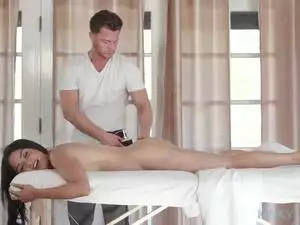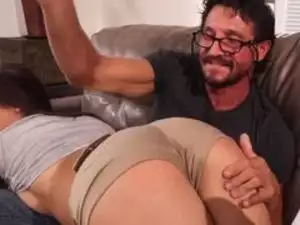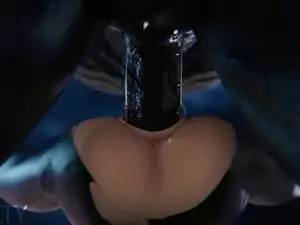Lorna Cheated 2
- 4 years ago
- 23
- 0

 4 years ago
4 years ago
LORNA AND GRACE – PART 2After their night together, the two lovers calmed down a bit and were especially careful not to be singled out or noticed. Grace’s aunt and uncle came back from the funeral and all was well except for the fact that Grace couldn’t have Lorna over anymore. The rule in Lorna’s rooming house was that a lady could have a visitor, only one, who had to have left by 10PM. No men were allowed except if they were a father or a brother (and they had to prove it). Although it didn’t...
 4 years ago
4 years ago
LORNA AND GRACE (A Lesbian Tale) – PART 3“I’ll leave you alone to rest, as I’m sure you had a long evening”, said Janice smiling“Thank you”, answered Lorna“But I’ll make sure we talk later this week, when your friend is here”, added JaniceLorna’s head was buzzing and she would have agreed to anything. She was exhausted. Two hard orgasms in a few hours, not mentioning the heavy sex, Grace’s cold shoulder, and questions to be asked and answered. Lorna hoped she would sleep and be able to talk...
 4 years ago
4 years ago
Steve was the manager at a big but not busy London hotel. In fact it was so quiet, that Steve was intent on making love To Lorna in all fifty rooms of the hotel. He was only nine rooms from his goal, and on the night they completed all the rooms, he planned to ask Lorna to marry him. Lorna, though was ambitious, and had been cheating on Steve with a high ranking human resources officer. Steve spent the last 2 weeks sulking over the break up, and due to his lack of interest, the hotel...
 3 years ago
3 years ago
It was 1965, my mom and dad were broke but my mom Lorna was 2 months pregnant with me, her and Norman decided to get married. As Lorna’s sister advised her how to get this dress, and order these flowers and get this guy to take the wedding pics…it was apparent that there was no way they could afford this wedding.Lorna said “Norman, I might have a plan.”“What plan?” said Norman“I think I can think of a way to pay for the photos” smiled Lorna.“How” said Norman againLorna just smiled and never...
 2 years ago
2 years ago
LORNA and GRACE (A Lesbian Tale) – PART 4Grace followed Helen into the Hotel Belleville and they both walked by the man at the reception desk without a problem. Helen also owned the Hotel Belleville. They walked up the wide but worn stairs to room 24. “Remember. Don’t make a fuss about who she is”, reminded HelenHelen knocked and pushed the door when she heard the “Come in” from inside. That hotel used to be fairly posh when there were many trains that crisscrossed at Belleville, but other...
 4 years ago
4 years ago
LORNA and GRACE. Part 7« What are you doing for Thanksgiving ? », asked Lorna, getting her desert out of her lunch bag.“Oh…I have to go East to visit family”, replied Grace who was improving at lying.“I thought your family was in Canada”, asked Lorna a little suspicious“Some of the family immigrated to the US a long time ago”, replied Grace in a tone of voice which showed she didn’t care to pursue this topic any further.“The Market is closed so maybe I’ll see what Alice and Janice are doing”,...
 2 years ago
2 years ago
I was an only child, raised on a small croft in Scotland. There were no young families nearby so until primary school I had little contact with other children. Even then, I remained an outsider because most of the kids already knew each other and had established groups of friends.Mary and I first met during my third year at school. She and her mum Judy had newly moved to the area and were staying in a farmhouse that was one mile away from my home. Fortunately, Mary and I hit it off straight...
Lesbian 3 years ago
3 years ago
LORNA and GRACE. PART 6It was in the semi-darkness of the town library that the two closeted lesbians came together in a bearhug and a long and wet French kiss which had their saliva dripping on their chest. Both women knew there was no going back, no changing your mind, and that, after this kiss, the next step was sex. The women had a lot to say, either about the recent conversations, their attempts at getting together, their shyness, and mainly their lust for each other. But that was neither...
 2 years ago
2 years ago
Hello my name is Lorna Gibbons and I have spent the last five years in an orphanage when my parents were killed in an automobile accident, I never expected at 17 that someone would adopt me, but my newly acquired parents were very good people and explained to me that they knew that no one was going to adopt a 17 year old girl, so close to turning an adult, and by that reason alone they gave me the gift of spending my last year in a real family home and not an orphanage. Bob and Linda Channing...
Transsexual 3 years ago
3 years ago
LORNA AND GRACE – PART 9The news of the upcoming fuck-fight between Gloria and Grace spread like wildfire. The ladies were very excited. Gloria was not new to this crowd and she had her fans but some disliked her tremendously and stayed away for her in spite of her charms and her expert lovemaking. Gloria could be rude, obnoxious, and pretentious. She practiced rough sex. The blonde was medium height (same as Grace) but thinner than her opponent. Both were blondes but Gloria was the California...
 4 years ago
4 years ago
LORNA AND GRACE – PART 8Grace spent her Sunday walking around the city and admiring the architecture. She had a nice lunch in a restaurant which had been recommended by Charlotte. It had been a long time since she had been alone in a strange city. She enjoyed the freedom and felt that people wanted her, needed her. She had totally lost her inhibitions about being a lesbian. She not only accepted her “condition”, she was happy about it since it gave her a lot of pleasure and made meet a lot of...
 4 years ago
4 years ago
Hey guys its moby again.. this time its a story of how i laid my cousin sister…well to tell bout her.. she’s 19 years old.. fit 34 – 24 -32 size.. she looks really cute.. fair with nice long dark black hair… her name is mansi… she lived in Hyderabad most her life.. once she had an exam in my city .. some entrance exam.. my aunt called my mom to ask if she can stay over our place my mom agreed and told her that i will look after her.. as my parents were going out of station and i had to go early...
Incest 4 years ago
4 years ago
It was the day of action, we had spoken to Susan's daughter and found out she would be alone this weekend, as she had lots of papers to grade, and her husband was taking the k**s to his parents house for the weekend.Jade had spoken to Susan at the end of our lesson asking if she could drop her course work off later for Susan to have a quick check over to see if she needed to add anything extra.Susan was a strict teacher, but she liked Jade knowing she had potential to do well, if she could just...
 4 years ago
4 years ago
‘Doreen, I really am sorry,’ Lois told the woman who had been her lover for almost a year, ‘but I…I’ve made up my mind. I can’t see you any more.’ She had stopped by the assistant principal’s office at the end of the school day. She’d finally decided to break off her relationship with the assistant principal and mustered the courage to face Doreen and give her the news. ‘But darling, why?’ Doreen asked, pain showing in her eyes. ‘What we have is so wonderful, isn’t it?’ ‘That’s what makes...
 3 years ago
3 years ago
WARNING TO READERS – This is a long, rambling, multi-part story and VERY British. The individual chapters will make more sense if read in sequence. This Chapter is dedicated to the group of ex-pat Guys and Girls on Ibiza and Menorca who have supported this story from the beginning, this is the chapter I was tucked away on the boat editing in the afternoons. It was a real pleasure to meet you this summer, the meal and drinks were great…… my treat next year. The Touch Pt. 36 – Of Aunts and...
 4 years ago
4 years ago
Hi friends let’s go with the new story. This story happened 3 years ago when I was 20 years old and my mother was 41 years old. We are a very small family – me, Rahul, my mother Lakshmi and father Raghuvardhan. My father was 53 years old when this incident happened, and he was working as a supervisor in mining industry. He used to come late in the night, like 1 or he usually works night shifts and his rest period is daytime. For me, from my childhood I have never been much fond of him....
Incest 2 years ago
2 years ago
Hi, this is Amit again. The appreciation from all of u has promoted me to share another wonderful experience of mine. I’m from Mumbai, 35 yrs, married, 5’10”, athletic built, quite handsome, with attractive eyes. I am adventurous and have a fairly high sex drive. This incident happened around 4 years back. I used to travel a lot and during the evenings, to kill time, I enrolled myself in dating sites. It was fun interacting with females, although most of them were professionals, but u did find...
 4 years ago
4 years ago
Wife got hubby a gift of a coed and he enjoyed the one-night-stand. Wife got a reciprocal gift, a guy, but it gets complicated.Geoffrey’s was a cute twenty-two-year-old coed who simply wanted someone to take her virginity, pre-marriage vows. Jenny hit the jackpot with an urbane Black guy who was skilled in the art of seduction and romance.Jenny had helped set up her husband’s liaison with Gwen and got to watch her husband perform. Both Gwen and Jenny judged husband as doing a good job. However,...
Wife Lovers 3 years ago
3 years ago
Robyn and her party caught up with Pēteris and Maggie two towns away where they were staying at an inn with the two disguised Damsels. Pēteris and Maggie were now dressed in their original style. Maggie had gladly and tenderly shaved away his beard and trimmed his hair. He had used his journey and their short stay to rid himself of the new horses and most of the loot he and Maggie had acquired. The supplies he retained for the remainder of their journey. They found the two Damsels somewhat...
 2 years ago
2 years ago
Introduction: Two horny teens let their passion out on Puplic transport after school. We both had after school rehearsals till 7pm on Thursday. He was in music and me in drama. I got out early and found out my parents couldnt pick me up, meaning I would have to catch the train home. I stood there in the wind deciding what to do. My long straight brown hair blowing behind me. I had an athletic build with nice breasts. Today to school I wore my button up white blouse and skirt. I heard music...
 1 year ago
1 year ago
Isabella De Laa is a tall drink of water who is dressed to impress for her date with Lutro. Lutro wines and dines Isabella with some nice sushi and whiskey. After only a bite or two, though, Isabella makes it clear that Lutro can have anything at all he wants as long as he gives her some deep pleasure in the process. Lutro doesn’t wait for Isabella to ask twice. Instead, he comes around to cup Isabella’s twat as he pulls her miniskirt up. The meaty surprise that awaits him is like a...
xmoviesforyou 4 years ago
4 years ago
New Year’s Day. The group of six, everyone except Emily and Aggie, began their trek shortly before8 AM, six bicyclists all with side-cars. They reached their destination a little more than an hour later, the Hot Toys and Hobby Shop at the 25.1-kilometer mark of Black Mall. It was the last locked store of the black spiral, and the location where they had the remaining 3,000 black mushrooms locked in storage. Like no other Mall, the black spiral gave Mark the creeps. His hair felt raised on...
 3 years ago
3 years ago
Chapter Two: Futa's First Fertile Hot Wife By mypenname3000 Copyright 2018 April 17th, 2047 “So, you were initially shocked and shaken by learning that women you had sex with, despite them being on birth control, were becoming pregnant,” Adelia, the caramel-skinned talk show host, said. “You clearly accept and embrace the fact now, but how did you get to that point were you found it...?” “Hot?” I asked, an amused smile playing on my lips, my clit-dick aching so hard beneath my skirt...
 2 years ago
2 years ago
Once in the stock tank, we splashed around for a few minutes, then Diane and Holly took their tops off, as they'd done the day before. I was surprised again when, after a brief hesitation, Susan elected to do the same - if a bit more nervously. With the material covering them gone, I could see that she had smallish breasts - about the size of baseballs - capped with small, chocolate-brown areolas and nipples. I let her see me looking at her, then smiled to let her know that I appreciated the...
 4 years ago
4 years ago
It was my Dad. He sounded half asleep. “His Lordship’s daughter just rang,” he said. “She needs a lift home, Can you get her do you think?” “She’s in town, twenty one A Braithwaite Street.” “Look I got lectures first thing and how’s she going to like being fetched in my Mini?” I asked. He sort of pleaded, “Well your rooms are about a mile from her and I’m twenty five miles away, and I have a six thirty start myself, are you sure you can’t help?” “OK,” I agreed. That was the trouble, dad...
 4 years ago
4 years ago
After about an hour and a half, I noticed that her heartbeat still remained rapid, as did mine. I could tell her eyes were still wide open, and I was still thinking of her hot naked body pressed so tightly against mine. It was around this time that I noticed it was cold outside our sleeping roll, which was very wet with our sweat. There was no heavy breeze against our tent, though I still heard the rain dropping against it. As I continued to calm down from what had just transpired, I felt her...
 4 years ago
4 years ago
At 2 am Laurie comes home from the late shift, earlier than usual. She tosses her frumpy nurse’s scrubs to the floor next to the rest of her laundry, both dirty and clean. “I’ll clean up tomorrow,” she says to herself, knowing she won’t. After a long shower that fogs up the mirror and leaves more water on the floor than her regular shower, Laurie makes her way to the bedroom of her tiny, one-bedroom apartment, vibrator in hand. “I can always count on you.” She squeezes the handle of her...
Seduction 2 years ago
2 years ago
Jessica and Sabrina rode along, smiling back at “Long Tom”, their self appointed minder while their father was gone. He got his nickname because of his buffalo rifle, and his ability to hit targets at incredible distances. He had coached Jessica a lot, helping her with her rifle. He called her Sunshine because of her blond hair, and he called Sabrina Shadow because of her raven curls. “Besides,” he’d grin, “If you saw Sunshine, you know she always has a Shadow.” They had bonded, girls raised...
 1 year ago
1 year ago
I waited by the phone. She called me at about 7pm. Jas says "Hello darling! I see you in about half an hour. I've got a friend with me. It's Imran from my work. He's gonna drop me off. You can meet him. I'll think you'll like him. " "see you in a bit"I said. "You serious!" "Yes darling. " She replied. "See you in a bit" Fucking hell I thought. She's bringing the man here. I had a great massive hardon. Soon I heard the car. I looked from the window. Jas got out of the car. Her lover got out of...
Cheating Wifes 2 years ago
2 years ago
Mila Monet finds herself in Mr. Producer’s guest room, in just light, lacy lingerie lashed over her tanned and toned skin. She explains how she got into porn because her friends were in porn, then goes on to explain what else she would do because her friends did it–namely, Mr. Producer. She strips down and starts to rub her wet little pussy, getting it nice and ready for Mr. Producer’s hard cock. She sucks her pussy off of his cock before feeding it right back into her pussy....
xmoviesforyou 2 years ago
2 years ago
Amy 3: Little Orphan Amy! by Amy Komori The original characters and plot of this story are the property of the author. No infringement of pre-existing copyright is intended. This story is copyright (c) 2010 Amy Komori. All rights reserved. Chapter One: Liz Phair's Second Album I still had no real identity, but once we got back from Florida, Mrs. Komori immediately started building a fake one for me. The idea was that as soon as Mrs. Komori could swing it, Amy Komori would...
 3 years ago
3 years ago
Last week she called me saying she was damn depressed about not being that happy with her job. We keep talking a lot of office stuff so we decided to meet at her place saturday evening to discuss jobs. I reached her place at 9 pm and was stunned to look at her in her linen short skirts and sleevless tshrt. She had one of the most amazing bosies ever..so we met..greeted with a social cheek to cheek kiss.. We started talking over glasses of diet pepsi n snacks…and thn she said she had this french...
 3 years ago
3 years ago
Gosh, I don’t know where to begin. So much has changed since my niece came to live with me. My brother and sister-in-law died in an automobile accident. I was their daughter’s only living relative. On my flight to Utah, I thought of Amy. The last time I saw her was three years ago. She was 10, blond with blue eyes, and tall for her age. I was visiting my brother for his 10th wedding anniversary, and I had enjoyed myself during that visit. My niece and I were inseparable. I was 12 years older...
 1 year ago
1 year ago
Whitney Wright is waiting in the massage parlor for her next client when Chanel Preston practically bursts into the room, apologizing for being late. Her husband was slow leaving the house and dropping her off on his way to work. She tries to play it off like it doesn’t bother her, although it clearly does. Whitney assures her that everything’s all right, telling her that she can remove her shoes and clothes and lay on the table. Chanel does exactly that while ranting about her...
xmoviesforyou 3 years ago
3 years ago
Hi I m rakesh 27yrs , working electric company in barmer, 5’7″ and having a good looking personality. I m going to tell u my story which happened with me last summer. As i m 5’7″ and having good physique. All the ladies who see me got impressed with me. Last summer i was going from jodhpur to Barmer by a passenger train. I was sitting on my seat in general compartment. One widow(Sarla) which i came to know later) was also sitting besides me near window. It was a late train and started from...
 3 years ago
3 years ago
The long dark tendrils of sleep were slowly but surely being driven away by the gradual invasion of awareness. I finally began to stir. As I lay there with my eyes closed, trying to postpone the inevitable arrival of wakefulness, I gradually became aware of a sense of contentment.I also became aware that I was lying in a bed that did not feel like my own. I forced myself to open my eyes and was immediately struck by the uncomfortable feeling of not knowing where the heck I was. I began looking...
Exhibitionism 4 years ago
4 years ago
“So you have to go with her?” Ada asked him. Knowing what Ada truly wanted and desired Angus looked at her wishful face. He also wished, right then and there, that he too could be with both women at the very same time, once again. He still felt unsure of what he’d done with them but upon seeing her and how she appeared those feelings seemed to dissipate. Seeing as he wasn’t really that kind of man who “whored” around like he with two women it was to him to make a decision if he was an immoral...
Mature 3 years ago
3 years ago
A rather long story continuing the adventures of my mind-controlling protagonist. If you want to read more about the protagonist and how his powers work, seek out my earlier stories. I am greatly indebted to: Doorknob22 for his invaluable advice on earlier drafts. PandaPensif for his translation of the French dialogue and his insights on the story. Vibes for his translation of the Italian dialogue. (It is not necessary to understand French or Italian to read this story.) As always...
 4 years ago
4 years ago
In the year 2050, humans have started creating humanoids. These humanoids resemble humans in every aspect. They can think, talk, eat, drink and even have sex!!! But they are too expensive. Only millionaires can think about buying them. A leading humanoid manufacturing company, Technotrons inc. conducted a lucky draw. Winners will be awarded a free humanoid designed to their liking. You have enrolled yourself in the draw and luckily you have won!!! Now its time to design the female humanoid!!!!
 4 years ago
4 years ago
Mind Swapping Chapter 5 I awoke late on Wednesday morning. I crawled out from between Carol and Barbara's still sleeping forms. It was my turn to fix breakfast and I was going to have pancakes and coffee ready before they woke up. But, first, I needed to go to the bathroom. I tinkled, washed my hands and checked my appearance in the full length mirror. Since my long blonde hair was slightly tangled, I gave it a few brush strokes. I applied a dab of pink lip stick to my full lips and...
 4 years ago
4 years ago
What can I say, everything happens for a reason. Well at least that’s what I’ve always been told. I just can’t believe it was happening to me. Let me introduce myself, my name is Brandy. I’m 26 years old, married with two kids, and my husband and I both had good jobs. From what I could tell everything in my life was going well, until I walked in on my husband and my best friend (well I thought she was) in my house, in my bed. Let me start from the beginning. I decided to be nice and surprise my...
 2 years ago
2 years ago
?OK, your cars good to go? I said as I walked into the house from the garage. Cari was sitting on the couch lighting a cigarette, ?thanks, have a seat, I wanna ask you something.?Sitting in the chair I asked ?Shit, what did you break now???Nothing,? she said laughing, ?I just want to ask you a few things. Why are you always willing to come over here and do everything that needs done.??Why not, someone has to do it. You aren’t the most mechanically inclined person in the world, and I have a lot...
 2 years ago
2 years ago
Al and Stephanie looked like they belonged at the bike week celebration. Both were wearing tank tops; Al's showed off a powerful set of arms and a barrel chest. There was nothing barrel like about Stephanie's chest. She was blessed with an immensely huge set of knockers. Stephanie was a natural blonde wearing sunglasses. Al's arm was thrown around her shoulder. Like many of the men present at bike week, his head was shaved and he had a goatee. He also had an iron cross tattooed on one arm....
 2 years ago
2 years ago
Before our first orgy, our sex life had been pretty good, but afterwards it was spectacular. I usually got home from work half an hour before Jim, and in the past I had had the dinner ready soon after he got home. Now however I stripped off my clothes as soon as I got home and was waiting for him in the kitchen. I got a kiss and a quick grope as soon as he came in, then he disappeared to the bed room and came back naked to find me bending over the kitchen table, presenting my arse and...
 2 years ago
2 years ago
~~~~~~~~~~~~~~~~~~~~~~~~~~~~~~~~~~~~~~~~~~~~~~~~~~~~~~~~~~~~~~~~~~~~~~~~~~~~~~~ It had been 2 days from I spoke to Jill. I didn’t want to bombard her as I wasn’t sure if Tom new about me and if he did what he was told. So I thought it best to let her contact me. Then I got a message asking if I wanted to meet up for lunch. I jumped at the chance. She told me where to go and to be there for 1pm. So as it was only 9.30 in the morning I went for a walk to take in some of the places I...
 4 years ago
4 years ago
We have a letter box at the front of our house, some neighbours at the back have another letterbox on their houses but we don't. Someone put a leaflet through ours, as usual it was rubbish so I threw it away. I was sat out on the patio when an Asian guy came on the back road delivering leaflets he offered me another and I said "No thanks". He asked for a glass of water so I invited him in.As he stood in my kitchen with a glass of water, he said he was delivering these leaflets for money as he...
 4 years ago
4 years ago
We'd been in the cinema foyer for about ten minutes or so when I first saw middle aged pudgy man. It wasn't his build that drew my attention. He was just a small, squat man with a substantial beer belly wearing an understated green and brown check three piece suit that had clearly seen better days. Nothing unusual about that.It wasn't his appearance either. He was nearly bald apart from a circle of wispy grey hair at the back of his head that ran from one ear to the other. And he obviously had...
 3 years ago
3 years ago
----------------------------------------------------------------------------------------------------------------------------------------------------------------------------------- Volume I The Lady Who Picked Me Up -- Tales Of Sport And Hunting : Part One She was a princess, queen of the Highway. Sign on the road said "Take us to Madre." No one can save her save the Blind Tiger. He was a monster, black dressed in leather. She...
 3 years ago
3 years ago
When it comes to religion I hold it in contempt and as for god,well at heart i'm an athiest,my gut feeling has always been god is as real as santa and the toothfairy but i might be wrong,Makes no difference if god is real,i've still no time or use for him :)Never had any urge to get under a priest cassock n i'm just not the submissive type but i'd be into corrupting a genuine priest.Pulling up his robes n bending him over the alter facing the fella on the cross.lol.Slapping his cheeks...
 2 years ago
2 years ago
I was sent down to Wheeling on a job that was to take two weeks, it took almost five but, I wasn’t upset. The first week I was down there I hooked up twice which made it very pleasant.The first guy was an older salesman who was two doors away at the cheap hotel I was staying at. The second night I was there I found that there was a small bar just past the motel. When I came from work I stopped in there for a drink or two. It had been a late day so it was past seven by the time I got there. The...
 3 years ago
3 years ago
They stopped speaking once they hit the water, both women abandoned their clothes in the heat of the sun, a little light breeze caressed their skin, speaking of the afternoon, threatening them with the cool that comes with night time. A little bit of wine under the same telling sun, earlier in the day had led to Cat unwrapping the scarf from around her friend’s neck and gently running its feather weight one whole length of her thigh. The delicate trace of the fabric had made the other woman...
Bisexual 3 years ago
3 years ago
So, a few weeks had passed since Brittany had sucked my cock and ate my asshole. Lisa returned home from work and things fell back into our usual pace, of work, dinner, Tv and then bed. Brittany had started school and was busy so she was hardly around. I did notice that my weed surplus was beginning to dwindle so I decided that I'd leave her a note, letting her know that I knew that she was helping herself. Not a huge deal, but she needed to know that I was not an idiot. Even if I did...
 4 years ago
4 years ago
They saw a lot of each other that first semester. They had at least one class together every day. They would meet for lunch, have dinner together, or arrange to meet in the library to study or do homework. They would go out socially on occasion, but neither of them considered it dating. They were just good friends, for now. Academically, John was having no trouble at all adjusting to college life. He had aced all of his mid-terms and was well on his way to a 4.0 first semester. Katie was not...
 1 year ago
1 year ago
The girl in the dressing gown opened the door. She went in. The room was quite small, it was warm and well lit. There was nothing special about it. Just a room in a house. Could have been someone’s living room. If there had been living room furniture. But what had she expected? A secret society? A temple? Or a dungeon? Bizarre artifacts, burning candles? Sinister gowns and ceremonial masks? An ancient book on an altar? Spells and chants? Chains and dildos? None of that was here. Why did they...
First Time 4 years ago
4 years ago
We got to the condo units and parked. We walked up to the door of my unit, which was across from the stairwell up to hers. She stopped and held my hand. “We can go right down, if you want. I don’t need anything, I just need you.” She said moving to kiss my lips and throw her tongue into my mouth. I felt blood rushing to my junk already. I already knew how talented her mouth was and knowing the mouth pasted to mine would soon be sucking my cock was an intense sensation. We climbed down the...
 2 years ago
2 years ago
I have a friend and her name is Brittany. She's 28 years old, about 5'4 and around 135lbs. She has black as night hair and a beautiful set of perky tits as I would soon find out. Brittany has been a very good friend of mine ever since she dated my brother about 10 years ago. They broke up but Brittany and I stayed close over the years. I never really viewed her as a sexual partner, even though she is incredibly beautiful. We would hang out by ourselves quite a lot. Going to movies, dinner,...
 4 years ago
4 years ago
Rita Skeeter stepped out of Mr. Edgerton's office, having dropped off the most recent of her reports, setting out for her parole officer (for that, in effect, was Mr. Edgerton's function) the life she had led in the previous week. Absent from the report was any mention of her second visit to Nurmengard in the company of Harry and Sirius Black, for her activities outside of working hours were none of Edgerton's business. In any event, the biography (now close to completion) she was writing...
 4 years ago
4 years ago
Hi friends, I am Raj, age 19 from Mumbai. I am here to share a real incident of my life which changed my perception of women completely. I used to live with my mom Chitra who is 45 years old. She is good-looking, smart, tall, and has a well-maintained figure. My dad was working in Dubai and used to visit once or twice in 3-4 months. My parents were quite modern and friendly with me and we even used to have drinks together. My mom was quite open with me and so was dad. When I entered college, I...